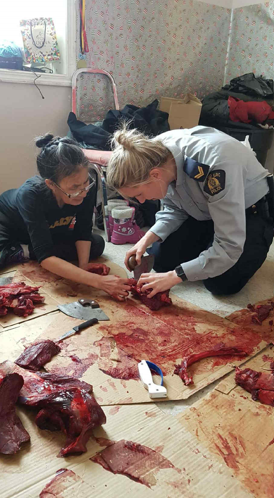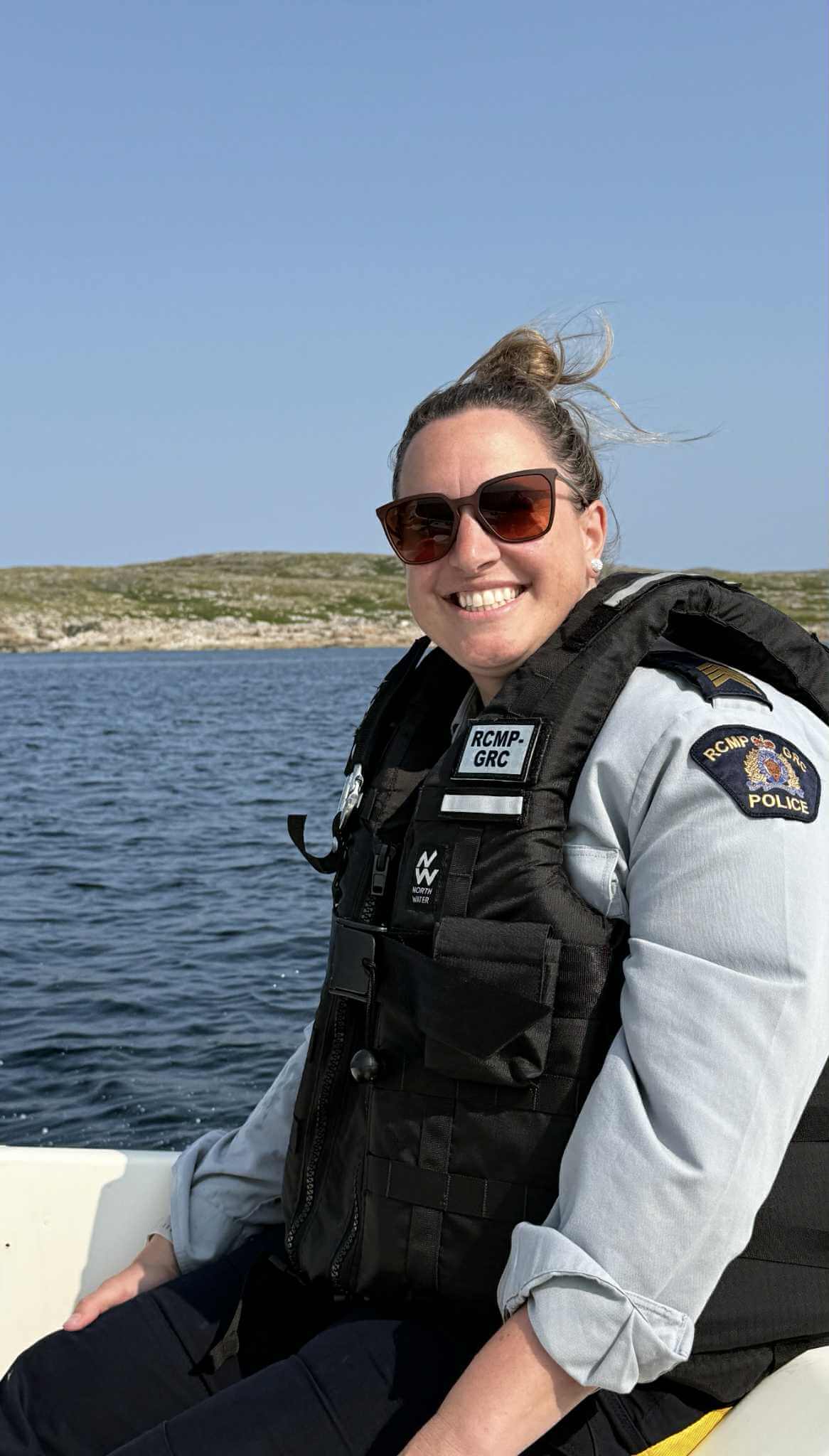At nineteen, Staff Sergeant Cara Streeter already knew of the RCMP — but the idea of joining Canada’s highly respected police service herself hadn’t yet crossed her mind. She was studying with the goal of becoming a doctor, dreaming of delivering babies; not policing the remote and rugged communities of Labrador. But life, as it often does, had a different plan — one that would awaken a purpose she didn’t yet know was hers.
While in University, a close friend working in law enforcement often shared stories from the field — stories filled with humanity, unpredictability, and purpose. Those moments sparked something in her: a curiosity that grew into conviction.
“Maybe I can try this,” she thought. And that small spark became the beginning of a remarkable journey — one that’s now spanned nearly twenty years in the RCMP.
Rooted in Small Communities
Originally from a small town in British Columbia called Clearwater, Cara’s path was shaped early on by small-community values and a deep respect for service. In her hometown, RCMP Members didn’t represent an abstract institution — they were a part of the community, and people she saw every day.
After graduating from Depot at 20, she chose to head east. Her first posting was in Newfoundland and Labrador, in the community of Corner Brook, followed by Happy Valley–Goose Bay and later Sheshatshiu, where she immersed herself in Indigenous and northern policing.
She spent the next several years gaining experience across the country — from Nova Scotia and Alberta to the Northwest Territories — before returning to Labrador more than a decade later. By then, she had worked in General Investigative Services (GIS), Major Crimes (Homicide), and Drug Enforcement, becoming known for her dedication to victims of domestic violence and sexual assault.
Coming back to Happy Valley–Goose Bay felt like coming home. Many of the friendships she had built years earlier were still there — now, the friends’ children attend school together.

Policing the North: Grit, Grace, and Adaptation
Policing in Labrador shares many similarities with policing in Canada’s northern regions, such as the Northwest Territories and Nunavut. The distances covered by each detachment are immense, the weather can be unforgiving, and the logistics incessant. Flights are often grounded by weather; communities can be cut off for days.
“You want to get there today,” Cara says, “but maybe there are no flights because of bad weather.”
She has learned to prepare for the unexpected — and to trust her teams completely. “If something is happening, then I have the confidence that they can deal with anything that comes their way” she says proudly. Communication, she emphasizes, is the lifeline of northern operations.

A beautiful day on the Detachment Services Assistant’s boat
Connection Through Creativity
One of Cara’s most meaningful experiences came not from enforcement, but from crafting. While posted in Paulatuk (Northwest Territories), she received a $15,000 grant through the Family Initiative Fund to support domestic violence prevention. Rather than purchasing off-the-shelf materials, she decided to bring people together through traditional skills — sewing parkas and mitts.
“With the money received, I bought all the materials and sourced sewing machines,” she recalls. “During that time, people were sharing their stories. We created a special bond. They saw me as part of the community.”
Those workshops became a model of community-based healing and connection. The final parka she made went to a young boy, hand-stitched with care. A colleague made a parka for his young child — a small but symbolic act of warmth and continuity.
A Leader Who Listens
As a leader, Cara is known for her empathy and inclusivity. She admits that, early in her career, she sometimes felt isolated “as there are not many women in the RCMP,”— but instead of letting that discourage her, she turned it into purpose. Today, she champions the empowerment of women, men, and allies alike.
Her philosophy is simple: don’t second-guess yourself — just do it. She encourages others to take the leap, to apply for promotions even when they feel unready, to trust that growth comes through courage. “You never know if you don’t take it,” she says. “Take the step. Don’t be afraid of change.”
Beyond the Uniform
Outside of her RCMP duties, Cara makes space for fun. She plays local sports — baseball, soccer, and hockey — and even runs a coffee-roasting business, rooted in her love of connection. “It’s about what you can learn over a cup of coffee,” she says with a smile.
When she needs to recharge, she and her family travel the remote highway, typically for her children’s sporting events – where her kids, she says, “see more than just their parents policing.” Her husband, a member of the Canadian Armed Forces soon to retire, has shared the adventure of moving from one province to another — their life defined by adaptability and purpose.
Remembering the People Along the Way
Looking back, Cara reflects on one simple truth: policing may take you across the country, but the relationships you build are what last. “It’s important to remember people along the way,” she says. “Check in on them.”
It’s advice that mirrors the way she leads — with both discipline and compassion, always mindful that service is about more than procedures and policies. It’s about people.

Learning to harvest Caribou from an elder
A Lasting Impact
In 2024, Staff Sergeant Cara Streeter was recognized as one of Newfoundland and Labrador’s award-winning police officers for her service, leadership, and contributions to community-based initiatives. Those who know her say the honour is well deserved — but she’d be the first to credit her team, her mentors, and the communities that have welcomed her.
Nearly twenty years after choosing a path she never expected, Cara has become a symbol of what modern policing in Canada’s North can look like: compassionate, courageous, and community-driven.
Her story reminds us that leadership isn’t just about rank — it’s all about heart.


